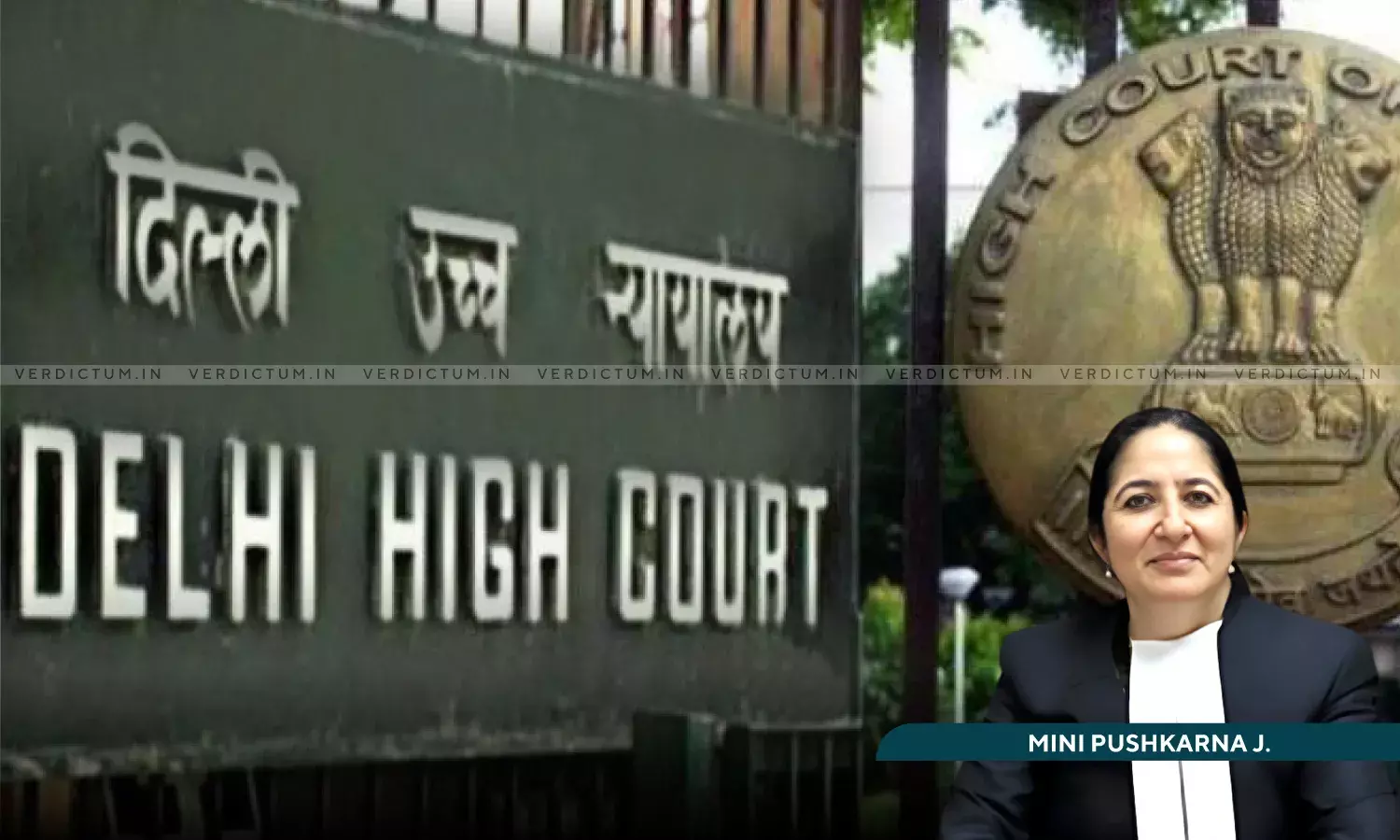Delhi High Court Grants Interim Relief To Goethe-Institut, Restrains Use Of 'Max Mueller' By Competing Entity
The Court held that the mark ‘Max Mueller Bhavan’ had acquired distinctiveness and goodwill through continuous use since 1957, and restrained the defendants from passing off their services under deceptively similar marks.

Justice Mini Pushkarna, Delhi High Court
The Delhi High Court has granted an interim injunction in favour of Goethe-Institut, restraining the defendants from using the marks ‘MAX MUELLER’ and ‘MAX MUELLER INSTITUTE’. The Court held that ‘Max Mueller Bhavan’ had acquired distinctiveness and goodwill since 1957, and found the defendants were passing off their services under deceptively similar marks.
The Single Bench of Justice Mini Pushkarna held, “…the plaintiff has prima facie established its prior user as well as goodwill and reputation, on the basis of the documents on record. Injunction is a relief in equity, and in view of the aforesaid discussion, the same is in favour of the plaintiff and against the defendants.”
The Court added, “Further, the balance of convenience also lies in favour of the plaintiff and against the defendants. Great prejudice shall be caused to the plaintiff if interim relief is not granted to the plaintiff.”
The Plaintiff was represented by Senior Advocate C.M. Lall, while Advocate Vikas Khera appeared for the Defendants.
Brief Facts
The Plaintiff is a society registered in Germany and is a well-known cultural institute owned and operated by the Federal Republic of Germany. The Plaintiff society was founded in 1951 and commenced its operations in India in the year 1957 by opening its first institute in Kolkata by the name MAX MUELLER BHAVAN. The Goethe-Institut of the plaintiff is also known as MAX MUELLER BHAVAN.
The Plaintiff contended that it offered German language courses and conducts examinations, and that the impugned marks MAX MUELLER/ MAX MUELLER INSTITUTE had been adopted by the defendants to misrepresent an association with the plaintiff.
The Defendants, on the other hand, submitted that “MAX MUELLER was not a coined or invented word, but the name of German Indologist and Sanskrit Scholar,” and that the mark had been adopted bonafidely “to give respect to professor Max Mueller.”
Reasoning of the Court
The Court recorded that Section 34 of the Trade Marks Act, 1999 recognises the rights of a prior user and protects its rights, which remain unaffected by any registration in favour of a party, who is a subsequent user.
The Court observed, “The present suit relates to rival marks, i.e., MAX MUELLER BHAVAN versus MAX MUELLER INSTITUTE for identical services, i.e., imparting German language education.”
The Court noted that the mark in question serves as a source indicator for the services provided by the Plaintiff, and the mark ‘MAX MUELLER BHAVAN’ had attained a distinctive character, and had assumed all the characteristics of a trademark.
The Court rejected the contention of the Defendants that MAX MUELLER BHAVAN was merely a building name. It observed, “The plaintiff’s PAN Card and bank accounts in India are in the name of MAX MUELLER BHAVAN… it cannot be countenanced that a building has been issued a PAN Card or has bank accounts in various banks.”
Taking note of the Defendants’ adoption of the domain names www.maxmuellerinstitute.com and www.maxmuellerinstitute.in, the Court observed, “An average man of imperfect recollection, who may be searching for the plaintiff’s services, is likely to come across the said websites and confuse the same with that of the plaintiff’s.”
The Court also noted that the Defendants’ application for trademark registration was on a “proposed to be used” basis. “The user of the mark in question by the plaintiff, is much prior to the use of the impugned mark by the defendant no. 1”, it added.
Relying on the decisions of the Supreme Court in Laxmikant V. Patel v. Chetanbhai Shah, (2002) and S. Syed Mohideen v. P. Sulochana Bai, (2016), the Court reiterated, “The rights of prior user are recognised as superior than that of the registration and even the registered proprietor cannot disturb/interfere with the rights of the prior user.”
The Bench observed that, “The immense goodwill and reputation of the plaintiff, under the mark MAX MUELLER/ MAX MUELLER BHAVAN, is clearly discernible from the various documents on record.”
The Court concluded , “The defendants have clearly adopted and used the impugned mark with a malafide intention to pass off their services as that of the plaintiff… Therefore, no amount of use can cleanse such a tainted adoption.”
Accordingly, the Court restrained Defendants from using the impugned marks, MAX MUELLER/ MAX MUELLER INSTITUTE/ , during the pendency of the present suit.
Cause Title: Goethe-Institut E.V. v. Abhishek Yadav & Anr. (Neutral Citation: 2025:DHC:3337)
Appearance:
Plaintiff: Senior Advocate C.M. Lall; Advocates Karan Bajaj, Suman Jyoti Khaitan, Vikas Kumar, Vihaan Kumar
Defendants: Advocates Vikas Khera, Sneha Sethia, Yash Sharma


